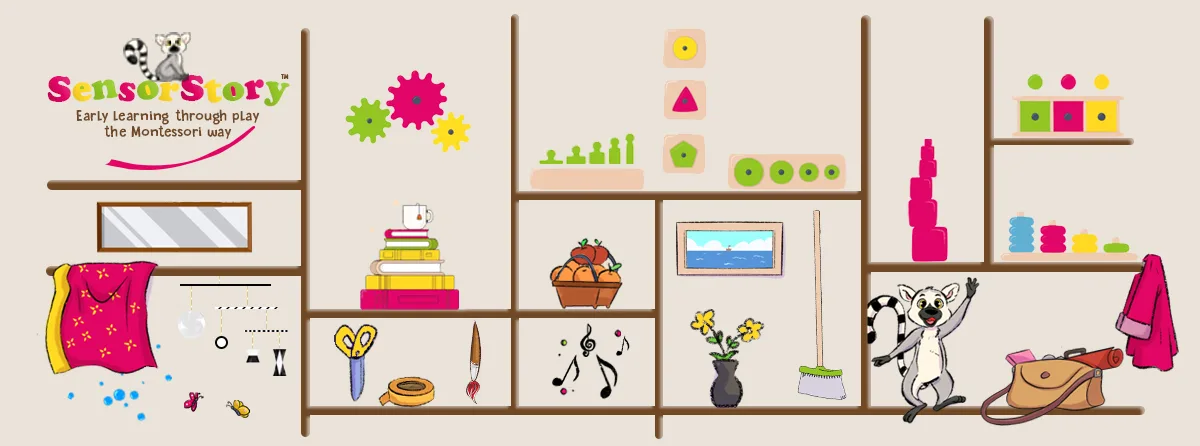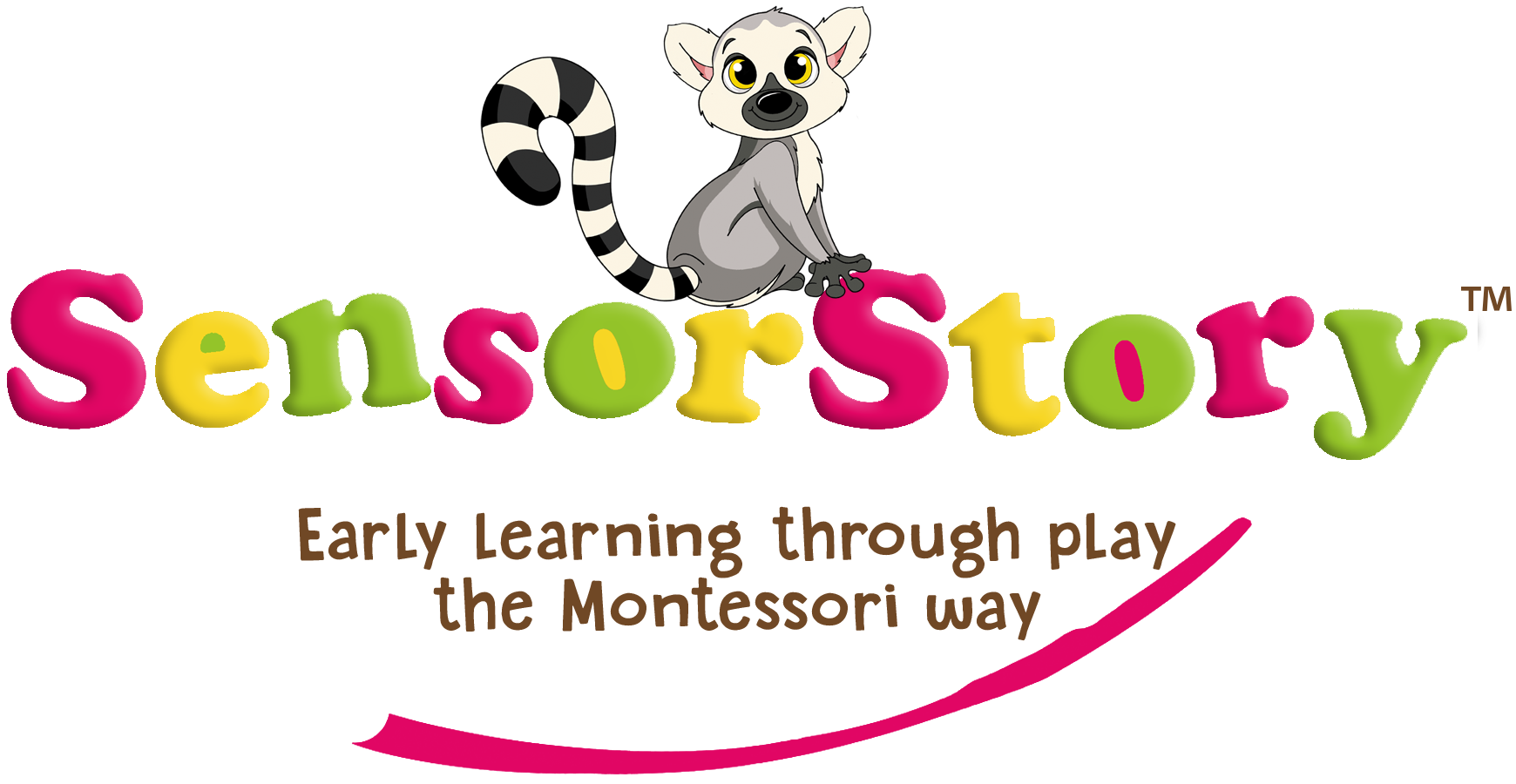We've put together a detailed list of at-home Montessori-aligned activities suitable for an 18-month-old.
Here you will see age-appropriate activities for all areas, in our Ultimate Series Of Activities to try at home, where the emphasis is on providing a prepared environment and allowing the child to actively engage in self-directed learning.
So what is my child working on mastering at this age?
Between the 18-21 month age, your child's is mastering advanced motor skills, progressing sharply in language development, where single word vocabulary grows in number and they start to put two words together to make a short sentence. Your toddler is enhancing independence in self-care, improving social skills, exploring the environment with increased organisation, and engaging in more complex sensory experiences. Order, organisation and routine continue to feel very important to them as the Sensitive Periods for order and small objects are well under way. To learn more about Sensitive Periods click here.

1. Practical Life:
* Simple dressing activities: introduce clothes with buttons or snaps for your toddler to practice dressing themselves.
* Introduce simple self-care routines, such as letting your toddler wash hands or brush teeth.
* Provide a small, child-sized broom or mop for them to participate in cleaning activities.
* Offer your toddler a small glass of water and a small pitcher to let them pour and drink by themselves.
* Chopping foods: offer your toddler a child-safe knife such as a wooden chopper, and some soft foods, such as banana, or tofu to chop.
* Simple flower arranging: provide your toddler with some fresh flowers, a small vase and a small pitcher of water to allow them to arrange the flowers by themselves.
* Observation: observe your toddler carefully and respectfully, without interrupting or distracting them, to learn about their needs, interests, and preferences.
* For further guidance on Practical Life Skills and activities by age, click here.
2. Eye-Hand Coordination:
* Everyday sorting: engage your toddler in sorting everyday items like socks or toys.
* Discs on a horizontal dowel: Give the child a toy with a horizontal dowel and some wooden discs to let them slide and remove them from the dowel.
* Peg puzzles: offer your toddler a peg puzzle to help develop their fine motor skills.
* Posting sticks in a sieve: encourage your toddler to post sticks or ear buds into a kitchen sieve.
* Transferring: have a tray with small tongs or large tweezers, along with containers containing small child-safe objects for transferring, such as wooden or felt balls.
* Offer picture matching cards, engage in object-to-picture matching and colour or shape matching games to promote fine motor skills and visual discrimination.
3. Movement:
* Walking challenges: set up safe walking challenges, such as walking on straight lines or along a curved path.
* Place a Montessori balance board in your toddlers envrionment for them to explore.
* Dance and movement to music.
* Monkey bars, swinging, sliding, running; local park activities for gross motor movement.
* Offer your toddler a balance bike and encourage them to push their feet on the floor.
* Pushing and pulling: offer your toddler a wheelbarrow for pushing or a wagon
for pulling.
4. Sensory Exploration:
* Tactile discrimination: offer sensory bins with various materials (sand, rice, pasta).
* Smell activity: offer home-made herb or spice smelling jars.
* Create a light box filled with different coloured objects.
* Sensory baskets: create baskets with a variety of safe textures for your toddler to touch and explore.
* Sound bottles: use clear plastic bottles filled with various materials (rice, beans, bells) to create different sounds for auditory exploration. Introduce sound-related words like "shake" or "rattle".
* Sensory bins: fill a bin with materials like rice, lentils, sand, or dried beans and hide small toys, objects or fabric letters for your toddler to discover through touch. Introduce scoops, containers, and small tools for exploration.
5. Language Development:
* Objects with identical cards for matching; classified sets of objects that have
matching cards. Identical pictures and objects, where the object can be put on top of the picture card to cover it. Allows your toddler to understand that a 3D item can be represented in 2D, for example a ripe yellow banana matched with an idential picture a ripe yellow banana.
* Objects with similar cards for matching; classified sets of objects that have
matching cards. Similar pictures and objects, where the object can be put on top of the picture card to cover it. Allows your toddler to understand the essence of an object, for example a ripe yellow banana matched with a similar, unripe green banana.
* Repetition of Words: Repeat words and phrases to reinforce vocabulary.
6. Culture:
* Cooking activities: explore simple cooking or baking activities inspired by different cuisines. Discuss ingredients, flavors, cooking methods, and encourage your toddler to try the new tastes and textures.
* Create sensory bins with sand and water to explore land and water formations. Use simple molds to create islands, mountains, and lakes, discussing the characteristics of each land form.
* Nature Art: collect natural items like leaves or flowers for simple art projects.
* Art and craft from around the world: engage in simple crafts inspired by different countries (e.g., Japanese origami, Indian rangoli) discussing the cultural significance of each craft. Offers and opportunity to encourage creativity and fine motor skills while fostering respect for cultural diversity.
* History: Montessori values an early learning of history to respect studies of the past, develop an understanding of ethics, and value the contributions of others.
7. Music Exploration:
* Instrument discovery basket: place a variety of safe, child-friendly instruments in a basket and encourage your toddler to explore and play with each instrument, using descriptive words for the sounds produced.
* Engage in interactive musical games.
* Sound jars: fill clear containers with various materials (e.g., rice, beans, bells), seal the containers and let your toddler shake them to discover different sounds.
* Listening walks: take short walks and listen to the sounds in the environment for exploration of everyday sounds. Discuss sounds like birds chirping, footsteps, or car noises.
* Rhythm sticks: offer lightweight sticks or wooden spoons for tapping and creating rhythms, encouraging your toddler to tap on different surfaces to explore sounds. Demonstrate simple tapping patterns for imitation.
8. Art and Self-Expression:
* Chalk drawing: have a tabletop chalkboard and a bowl of chalk in various colours, or explore pavement and garden wall chalk drawing.
* Leaf printing: collect leaves of various shapes and sizes, dip leaves in washable paint and press onto paper. Discuss leaf shapes and explore colour mixing.
* Offer washable, non-toxic markers and introduce basic strokes and lines.
9. Social Interaction:
* Create a dress-up box, with open-ended clothes such as scarves, gloves, glasses and belts, as opposed to prescriptive costumes that don't allow for creativity. Facilitate imaginative play and role exploration.
* Use picture cards or books to discuss emotions and develop emotion recognition. Encourage your toddler to express and recognise emotions in themselves and others.
* Playing with dolls is a great way to help your toddler develop their social skills. You can use dolls with different skin tones and hair types to promote diversity and inclusivity.
10. The Whole Child Development:
* Attend our weekly SensorStory Baby and Toddler Montessori parent-child sensory classes! Follow this link to enrol your infant here.
We hope we have given you some inpiration for activities to do with your 18-month-old!
Remember, follow the child, adapting activities based on your observation of your toddler's developmental stage and individual interests. The key in a Montessori environment is to provide your child with real, purposeful, and age-appropriate tools and materials that allow them to engage in activities independently and at their own pace.
Disclaimer: Adult supervision is required for any activity suggested by SensorStory. Please follow any directions and/or warnings on the labels(s) of any materials used during such activity & be aware of any potential choking hazards or allergies.
Click here to see our
Activities To Do With A 21 Month Old FAQ.
